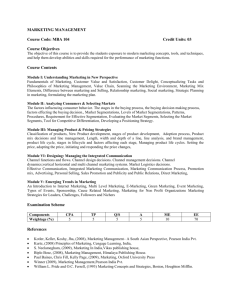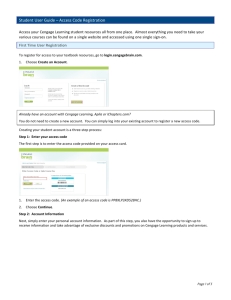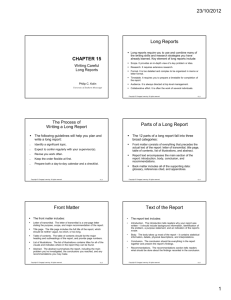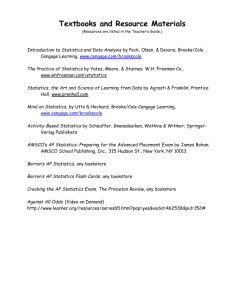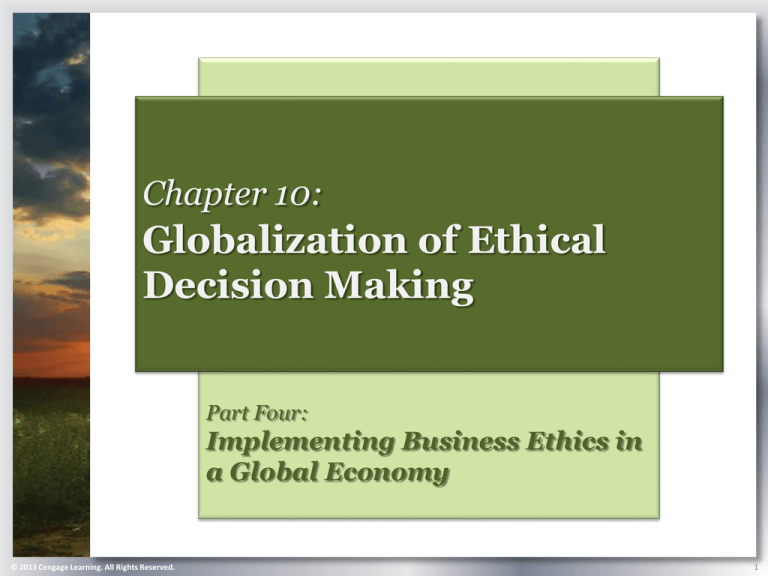
Chapter 10:
Globalization of Ethical
Decision Making
Part Four:
Implementing Business Ethics in
a Global Economy
© 2013 Cengage Learning. All Rights Reserved.
1
Global Business
Brings together people from different
cultures, values, laws, and ethical standards
International businesspeople must understand
the values, culture, and ethical standards of
their own country
Must be sensitive to values and culture of
other countries
The global business environment, if not
understood, can destroy the trust needed to
be successful
© 2013 Cengage Learning. All Rights Reserved.
2
Global Cultures, Values, and
Practices
Country cultural values: Are subjective, based
on the social environment, and used to
develop norms
National culture: Everything in our
surroundings that is made by people
Tangible or intangible
Each nation has a cultural belief about acceptable
business activities
Subcultures can be found within many nations
© 2013 Cengage Learning. All Rights Reserved.
3
Classifying Cultural Differences
Geert Hofstede identified four cultural
dimensions
Individualism/collectivism
Power distance
Uncertainty avoidance
Masculinity/femininity
Can profoundly impact the business
environment
© 2013 Cengage Learning. All Rights Reserved.
4
Self-Reference Criterion (SRC)
An unconscious reference to one’s own
cultural values, experiences, and knowledge
The idea that “we” differ from “them”
Is common in international business
We react based on our knowledge
Accumulated over a lifetime
Grounded in culture of origin
© 2013 Cengage Learning. All Rights Reserved.
5
Cultural Relativism
The concept that morality varies from one
culture to another
Can be a rationalization for straying from one’s
cultural values
Involves an idea that business practices are
differentially defined as right or wrong by
cultures
© 2013 Cengage Learning. All Rights Reserved.
6
Global Common Values
Shared across most cultures
Reflected in laws
Desirable common values
Integrity, family and community unity, equality,
honesty, fidelity, sharing, and unselfishness
Undesirable common values
Ignorance, pride and egoism, selfish desires, lust
greed, adultery, theft, deceit, lying, murder,
hypocrisy, slander, and addiction
© 2013 Cengage Learning. All Rights Reserved.
7
Economic Foundations of Business
Ethics
Economic and political events and natural
disasters can affect the global ethical
decision making environment
Financial firms have taken risks and engaged in
unethical activity
Displayed in the recent global financial meltdown
Global disasters and upheaval continue to
created challenges for international businesses
New opportunities for misconduct
© 2013 Cengage Learning. All Rights Reserved.
8
Risk Compartmentalization
Occurs when profit centers within an
organization are unaware of the
consequences of their decisions on the
overall organization
No single person can be blamed for negative
outcomes that occur because of systemic
problems
© 2013 Cengage Learning. All Rights Reserved.
9
Key Figures in Modern Economics
Adam Smith
Laissez-faire capitalism
John Maynard Keynes
Government can stimulate the private sector
Milton Friedman
Return to self-regulating free market system
© 2013 Cengage Learning. All Rights Reserved.
10
Keynes and Friedman Agreed That:
1. People have rational preferences among
outcomes that can be identified and
associated with value
2. Individuals seek to maximize utility; firms seek
to maximize profits
3. People act independently on the basis of full
and relevant information
© 2013 Cengage Learning. All Rights Reserved.
11
Economic Systems
Socialism: Advocates that wealth and power
be shared across society, based on the amount
of work expended in production
Karl Marx
Social democracy: Private ownership of
property, but a large government
Formed in the 1940s as an offshoot of socialism
Bimodal wealth distribution: Many poor and a
few very wealthy with a small middle class
•
© 203 Cengage Learning. All Rights Reserved.
Some argue it is a result of the global economic
system
12
Two Schools of Economic Thought
Rational economics: Assumes that people are
predictable and base their decisions on
maximizing utility based on resources available
Behavioral economics: Assumes that humans
do not always act rationally
© 2013 Cengage Learning. All Rights Reserved.
13
Economic Capitalism Country Differential
© 20123 Cengage Learning. All Rights Reserved.
14
The Multinational Corporation
Public companies that operate on a global
scale, without significant ties to any one
nation or region
The highest level of international business
commitment
Are subject to ethical criticism over their
impact on the countries in which they do
business
© 2013 Cengage Learning. All Rights Reserved.
15
Business for Social Responsibility
Many MNCs have joined because of
stakeholder scrutiny
Tracks emerging issues and trends
Provides information on corporate leadership
and best practices
Conducts educational workshops and training
Assists organizations in developing practical
business ethics tools
© 2013 Cengage Learning. All Rights Reserved.
16
A Comparison Between Countries and
Corporations
Country
GDP (millions $
U.S.)
Company
Revenues (millions
$ U.S.)
United States
14,720,000
Walmart Stores
421,849
China
9,872,000
Royal Dutch Shell
378,152
Japan
4,338,000
Exxon Mobil
354,674
India
4,046,000
BP
308,928
Germany
2,960,000
Sinopec Group
273,422
Iran
863,500
China National
Petroleum
240,192
Taiwan
823,600
State Grid
226,294
Argentina
596,000
Toyota Motor
221,760
Greece
321,700
Japan Post Holdings
203,958
Denmark
201,400
Chevron
196,337
Source: Adapted from "Global 500: Fortune's Annual Ranking of the World's Largest Corporations," CNNMoney,
http://money.cnn.com/magazines/fortune/global500/2011/index.html (accessed July 7, 2011).
© 2013 Cengage Learning. All Rights Reserved.
17
The International Monetary Fund
Emerged from the Bretton Woods
agreement, 1944
Makes short-term loans to member countries
with deficits
Provides foreign currencies for its members
Promotes responsible business conduct
Recommended new rules for large firms that
represent a systemic risk
© 2013 Cengage Learning. All Rights Reserved.
18
The United Nations
Founded in 1945; 192 member nations
Goal to promote world peace, improve intercountry relations, and support better
standards and human rights
Focuses on environmental and human rights
issues
© 2013 Cengage Learning. All Rights Reserved.
19
The United Nations Global
Compact for Businesses
10 principles that promote human rights,
sustainability, and the eradication of
corruption
Collaborative arrangement between businesses,
governments, NGOs, societies, and the UN
Voluntary membership
Members report on progress toward goals
© 2013 Cengage Learning. All Rights Reserved.
20
Ten Principles of the UN Global Compact
© 2013 Cengage Learning. All Rights Reserved.
21
The World Trade Organization
Established at the Uruguay round of the
General Agreement on Tariffs and Trade
(GATT) in 1995
Administers trade negotiations, settles trade
disputes, and monitors trade policies of
member nations
Addresses economic and social issues in
many industries
© 2013 Cengage Learning. All Rights Reserved.
22
Dumping
The practice of charging high prices for
products in domestic markets, while selling
the same products in foreign markets at low
prices
Places local firms at a disadvantage
The U.S. has anti-dumping laws in place
© 2013 Cengage Learning. All Rights Reserved.
23
Global Ethical Risks
Key risk areas
The “G-Zero” risk
Internet security and privacy
Relations with China
Political unrest, imbalances in power,
nationalism, and faltering economies in
emerging markets
Laws differ between countries
© 2013 Cengage Learning. All Rights Reserved.
24
Global Business Ethics and Legal Issues
© 2013 Cengage Learning. All Rights Reserved.
25
Bribery
Acceptance of bribes varies by country
Can be a challenge to determine what is a bribe
The U.S. Foreign Corrupt Practices Act (FCPA)
prohibits companies from paying foreign
officials to keep/obtain business
The U.K. Anti-Bribery act goes even further
Many major corporations have had issues
with bribery
© 2013 Cengage Learning. All Rights Reserved.
26
Antitrust Activity
Antitrust laws are meant to encourage fair
competition
Countries have differing levels of protections
Can create difficulties in international business
Vertical system: A channel member controls
the entire business system
Can occur when MNCs are allowed to grow
unchecked
Reduces competition and can put small
competitors out of business
© 2013 Cengage Learning. All Rights Reserved.
27
Internet Security and Privacy
Internet security is considered a top global
risk to business
Laws and regulations have lagged behind
technological change
Is a fairly recent business ethics issue
© 2013 Cengage Learning. All Rights Reserved.
28
Human Rights
An inherent dignity that should be afforded
all people with equal and inalienable rights
The foundation of freedom, justice, and peace in
the world
Codified in the UN Human Rights Declaration
Is becoming a serious issue for companies
© 2013 Cengage Learning. All Rights Reserved .
29
Health Care
A major global human rights issue
Over a billion people lack access to health care
globally
Is becoming a major business concern
Question remains whether access to health
care is a right or a privilege
© 2013 Cengage Learning. All Rights Reserved.
30
Labor and the Right to Work
Many people work outside their homeland
International firms today have many ethical
concerns related to labor
Gender pay equality
Right to join unions
Standards of living
Corporations must take labor issues
seriously to avoid legal and ethical trouble
© 2013 Cengage Learning. All Rights Reserved.
31
Compensation
Living wage: The minimum wage that
workers require to meet basic needs
Executive compensation
A major topic during the recent recession
Global demand for alignment between
performance and compensation
© 2013 Cengage Learning. All Rights Reserved.
32
Consumerism
The belief that consumers should dictate the
economic structure of society
States that consuming goods at an increasing rate
is desirable
Equates personal happiness with purchasing and
consuming products
Made-to-break (Planned obsolescence):
Encourages consumers to buy more items
Meeting with backlash from stakeholders who do
not believe that consumerism leads to happiness
•
© 2013 Cengage Learning. All Rights Reserved.
Not sustainable as resources diminish
33
The Importance of Ethical Decision
Making in Global Business
Ethical decision making is essential to
successfully operating in global business
Potential legal and political snares without a
knowledge of global ethics issues
Some large firms created officers/committees
to oversee global compliance issues
Successful ethics program implementation
requires employee training
Global firms must tailor programs to
international markets
Ethics is not “one size fits all”
© 2013 Cengage Learning. All Rights Reserved.
34

